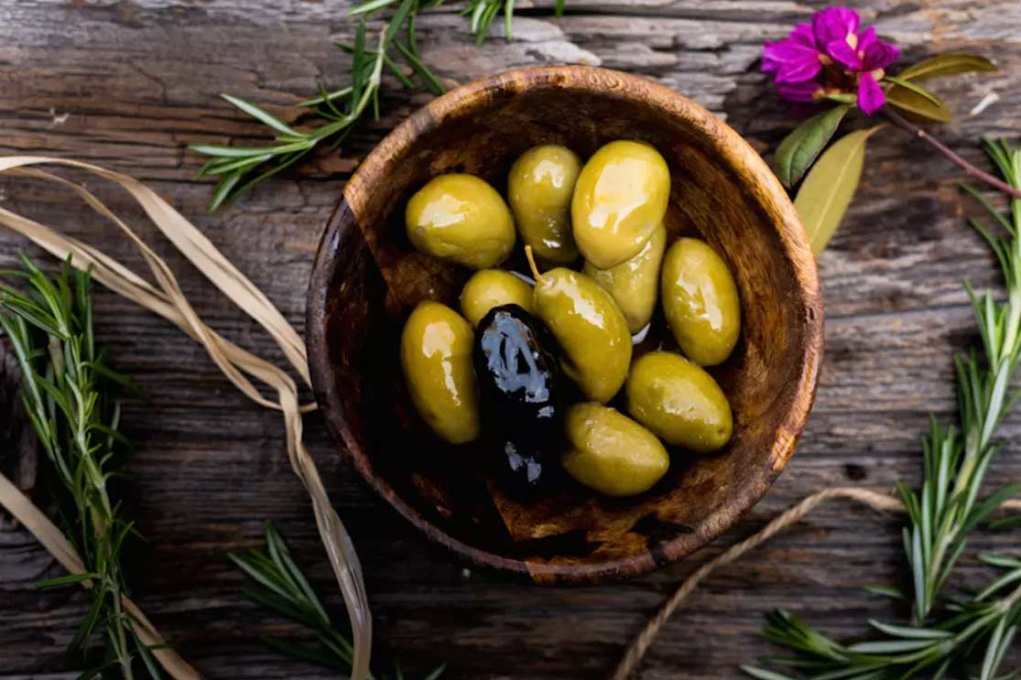
When I was a kid, olives were one of those foods I just didn’t quite get. They were salty and had a pit in the middle—a bit of a nonstarter for a kid in the market for sweeter treats. Fast-forward a few decades (OK, more than a few), and now my eyes light up at the sight of olives. Why? Because they’re a wonderfully tasty snack or mealtime ingredient that’s also a good-for-you indulgence.
In fact, olives pack such a healthy punch that working more of them into your diet is one of those no-brainer health-boosters nobody should miss out on. With all the varieties there are to choose from—roughly 500 or so—there is an olive to suit virtually every taste.
So as a functional medicine doctor, I recommend digging in to these precious pitted and unpitted powerhouses, and enjoying the benefits they can bestow from head to toe. Here’s why:
1. They are an anti-inflammatory antidote to modern ills.
Anything you can do to tamp down inflammation is a step in the right direction—and olives can help. Working them into your regular dietary repertoire will give your body more access to polyphenols, in particular, oleuropein, a chemical compound known for its powerful antioxidant, anti-atherogenic, anti-inflammatory, antifungal, and antimicrobial properties.
Better yet, those delicious polyphenols help cut oxidative stress in the brain and can help boost memory. In other words, olives are also a great way to feed your head.
2. They support your cardiovascular health.
Tucked inside each olive is fat—the healthy, monounsaturated kind, which helps boost good cholesterol and reduces the risk for hardening of the arteries. The monounsaturated fat in olives also contains oleic acid, which is linked to lower blood pressure and better cardiovascular health overall.
3. They’re great for your eyes and skin.
Olives are rich in vitamin A, an antioxidant that’s essential for protecting the cornea and maintaining eye health. It can help fend off age-related eye problems such as macular degeneration, cataracts, and glaucoma and, when it comes to skin, can help reduce wrinkles.
Olives also include vitamin E as well as the antioxidant compounds lutein and zeaxanthin, all of which offer additional eye- and skin-health support.
4. They can keep you trim.
Looking to reach a healthy weight? Olives can help here, too, thanks to those monounsaturated fats, which are linked to belly fat loss and better insulin sensitivity.
To help curb appetite in a healthy way, before sitting down to lunch or dinner, try snacking on a small serving of olives. The monounsaturated fatty acids (plus a bit of fiber) in the olives will help aid digestion and stimulate satiety hormones—so you’ll feel fuller sooner.
5. They’ll give you more energy.
Got glutathione? If you eat olives, you sure will, according to several studies that measured significant increases in glutathione levels in the blood after eating olives. Glutathione is essential to energy production, so getting enough of the stuff can be the difference between a vibrant, active life and one that’s anything but.
In addition, olives, particularly black olives, deliver a nice dose of iron, which is important for energy production and immune system function—so dig in to keep levels high.
How to Buy the Best Olives
OK, so now it’s buy time. You’re at the market, staring at a wall of olives and not so sure where to start. Here are a few tips on what to look for:
Step outside the supermarket. Head to the local farmers market and look for small-batch, artisanal vendors to get the best, close-to-organic quality.
Opt for organic. If you’re buying bottled olives, look for organic brands that have been “traditionally cured” in order to avoid the ones that have been cured with lye.
Skip the cans. Try to avoid buying canned olives from large-scale producers, which are more likely to be sprayed with pesticides during the growing process and then treated with harsh chemicals—namely lye, to speed curing—during processing.
Buy in bulk. Instead of canned versions, buy the fresher, high-turnover olives you’ll usually find in bins at the market. Buying just the amount you need from the bins will also make it easier to taste-test and find the ones that appeal most to your taste buds.
Important Notice: This article was originally published at www.mindbodygreen.com by Frank Lipman, M.D. where all credits are due.
Disclaimer
The watching, interacting, and participation of any kind with anything on this page does not constitute or initiate a doctor-patient relationship with Dr. Farrah®. None of the statements here have been evaluated by the Food and Drug Administration (FDA). The products of Dr. Farrah® are not intended to diagnose, treat, cure, or prevent any disease. The information being provided should only be considered for education and entertainment purposes only. If you feel that anything you see or hear may be of value to you on this page or on any other medium of any kind associated with, showing, or quoting anything relating to Dr. Farrah® in any way at any time, you are encouraged to and agree to consult with a licensed healthcare professional in your area to discuss it. If you feel that you’re having a healthcare emergency, seek medical attention immediately. The views expressed here are simply either the views and opinions of Dr. Farrah® or others appearing and are protected under the first amendment.
Dr. Farrah® is a highly experienced Licensed Medical Doctor certified in evidence-based clinical nutrition, not some enthusiast, formulator, or medium promoting the wild and unrestrained use of nutrition products for health issues without clinical experience and scientific evidence of therapeutic benefit. Dr. Farrah® has personally and keenly studied everything she recommends, and more importantly, she’s closely observed the reactions and results in a clinical setting countless times over the course of her career involving the treatment of over 150,000 patients.
Dr. Farrah® promotes evidence-based natural approaches to health, which means integrating her individual scientific and clinical expertise with the best available external clinical evidence from systematic research. By individual clinical expertise, I refer to the proficiency and judgment that individual clinicians acquire through clinical experience and clinical practice.
Dr. Farrah® does not make any representation or warranties with respect to the accuracy, applicability, fitness, or completeness of any multimedia content provided. Dr. Farrah® does not warrant the performance, effectiveness, or applicability of any sites listed, linked, or referenced to, in, or by any multimedia content.
To be clear, the multimedia content is not intended to be a substitute for professional medical advice, diagnosis, or treatment. Always seek the advice of your physician or other qualified health providers with any questions you may have regarding a medical condition. Never disregard professional medical advice or delay in seeking it because of something you have read or seen in any website, video, image, or media of any kind. Dr. Farrah® hereby disclaims any and all liability to any party for any direct, indirect, implied, punitive, special, incidental, or other consequential damages arising directly or indirectly from any use of the content, which is provided as is, and without warranties.








